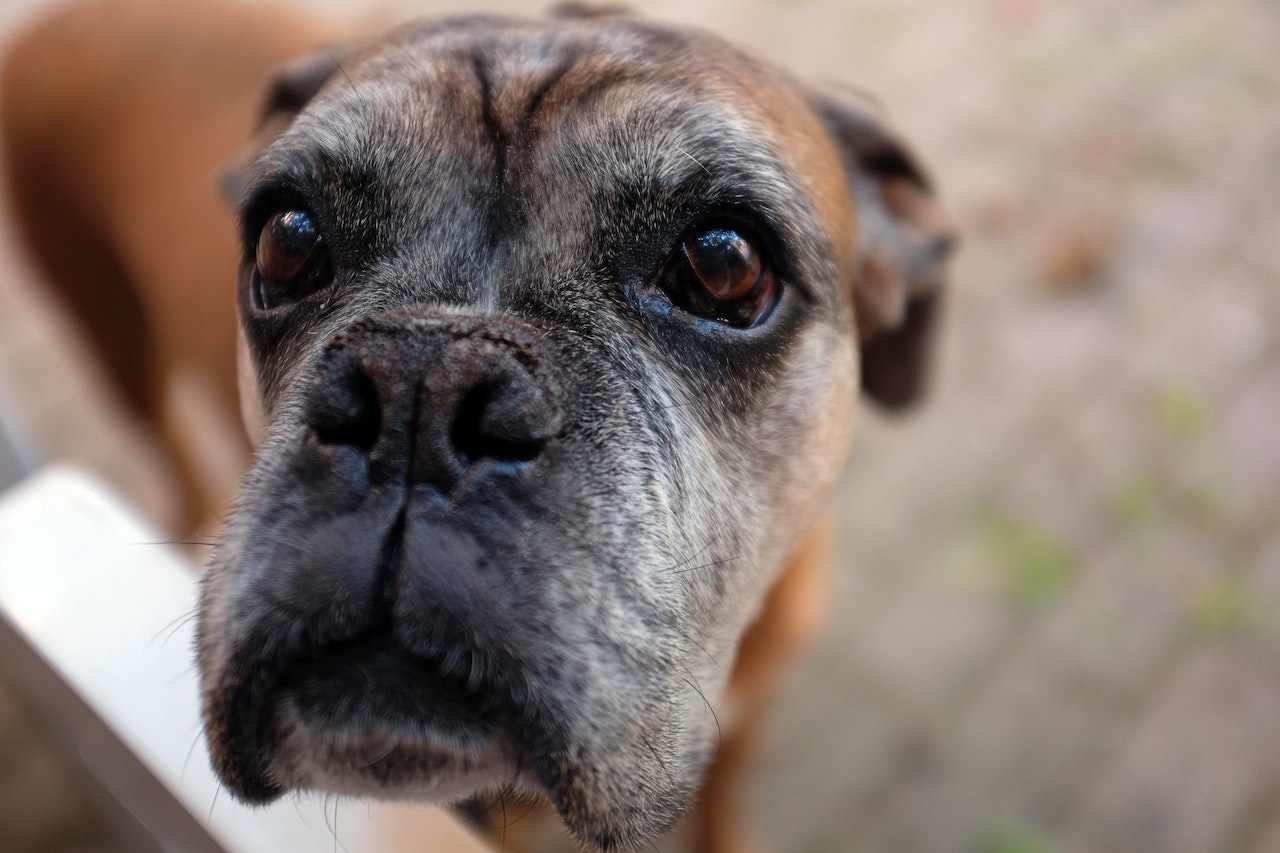Some of the reasons for excessive panting in older dogs are:
- Overheating
- Stress and anxiety
- Respiratory problems
- Obesity
- Medication issues
- Cardiovascular problems
- Eclampsia (Milk Fever)
- Metabolic acidosis
- Overactive thyroid gland
- Cushing’s disease
- Pain
Although panting is quite normal in younger dogs, it may be a sign of something more serious in senior pooches.
What Is Considered Excessive Panting?
First of all, let’s see how we can define “excessive panting.” As I’ve already mentioned, panting can be quite normal in some dogs. However, we ought to keep a close eye on our pooches.
Here are some of the symptoms to be on the lookout for:
- Our dog is panting noticeably more often than usual.
- The panting sounds raspy and is louder or harsher than normal.
- The dog pants at odd times, when it is not hot or exciting.
- The panting requires more exertion than expected.
Noticing such behavior over a prolonged period of time should trouble us. Before we start worrying, though, let’s determine what the likely cause of the panting is.
What Causes Excessive Panting in Older Dogs?
Did you know that a dog’s usual respiratory rate can go from 15 to 50 breaths a minute? Those numbers can vary depending on our dog’s age, weight, and overall health.
For example, younger and smaller dogs tend to breathe faster, whereas old and big dogs often take slower breaths.
Panting is usually nothing to worry about, but excessive panting in older dogs can signal a health issue.
Dogs pant in order to regulate their temperature. They are not capable of sweating, so they circulate air through their bodies and evaporate water through their mouths.
Also, Of course, if a dog is tired from playing, panting would be rather normal too.
Today, I want to go through the most common reasons for excessive panting in older dogs.
While some of the scenarios are quite simple and manageable, others require immediate medical attention.
If you have noticed that your dog is panting more than usual, read on to learn whether you should worry or not.
Overheating
Taking our old dog for a walk in the heat is generally a bad idea. Senior dogs are much more sensitive to it, and overexposure can lead to them suffering a heat stroke.
If our dog has heart or respiratory problems, excess heat can be very harmful. One of the main reasons dogs pant is that they feel hot.
So, we need to make sure our dog stays in the shade and always has access to cold drinking water.
Stress And Anxiety
Old age can lead to anxiety issues, even in the most confident and happy dogs.
Loss of smell or hearing, lack of bladder control, or eyesight problems can seriously stress out our canine buddies.
Moreover, older dogs produce less cortisol, the hormone that helps them deal with anxiety.
The Canine Dysfunction Syndrome, which often develops in older dogs, is quite similar to what Alzheimer’s disease is to humans.
It leads to great amounts of anxiety and stress, which, in turn, may result in excessive panting in older dogs.
Our dog might also be afraid of something. The fight-or-flight response to stressful situations is normal.
However, if our dog exhibits fear for prolonged periods of time, we might be dealing with a full-blown psychological disorder.
Respiratory Problems
Dog breeds that have short noses are more prone to breathing difficulties than the rest.
Short-nosed dogs, like boxers or pugs, might develop problems with their upper airway, which will lead to frequent panting.
Such dogs are also more susceptible to heat strokes, as their panting is not as effective as it should be.
If our dog belongs to such a breed, we need to learn what its standard breathing rate is. That way, we will immediately know if something is out of order.
One common issue is laryngeal paralysis. This condition causes the muscles and cartilages that open and close the larynx to malfunction.
As the laryngeal cartilages do not open as they should, breathing gets difficult. This results in raspy panting and severe shortness of breath.
If we suspect that our furry friend is experiencing breathing issues, we must seek medical attention as soon as possible.
Shortness of breath can be caused by serious health conditions such as pneumonia, lung cancer, or injuries to the chest wall. Therefore, we must not waste time!
Obesity
If our dog has weight problems, those might explain the excessive panting. Overweight dogs overheat faster, so they may pant more frequently in order to cool off.
Chunky dogs will also have trouble with physical activities, which, in turn, makes the obesity problem worse.
Even though some of us find chubby dogs adorable, this condition poses serious health risks.
Much like with humans, obesity can lead to all sorts of heart, liver, and joint diseases. Serious issues such as pancreatitis may endanger our dog’s life if not treated properly.
Because of that, we must ensure our dog eats plenty of organic meat and eggs, while also getting enough exercise.
Medication Issues
As our dogs get older, they often develop conditions that require them to take prescription medication.
But as it turns out, some types of drugs can have an effect on our dog’s respiratory system.
My research has singled out a steroid called Prednisone, which is used for treating arthritis, lymphoma, and various other diseases.
It can lead to shortness of breath, so in case none of the issues so far apply to your dog, and they are on this medication, perhaps the drugs are to blame.
If we suspect that prescription medication is causing our dog to pant a lot more than usual, we must consult with the vet who prescribed it.
If this truly is the root of the issue, maybe the vet can offer an alternative. In case nothing can be done, at least we would know why the dog is panting all the time.
Cardiovascular Problems
If the excessive panting in an older dog develops suddenly, it can be the result of cardiovascular disease.
Seniors are prone to develop conditions such as cardiomyopathy, heartworm infestation, or congestive heart failure.
If the shortness of breath is complemented by lethargy, coughing, and weight loss, one of those issues is likely to blame.
Once again, we need to act responsibly and take our dog to the veterinarian right away. They will be able to assess the situation and prescribe treatment.
Eclampsia (Milk Fever)
This dangerous condition can develop in older nursing mothers. Sadly, most cases go completely unnoticed by humans.
Nursing lowers the calcium levels in the mother’s blood, which then leads to problems with standing and walking.
On top of that, the mother can experience excessive panting and tremors.
If not detected and treated early on, eclampsia can be deadly. So, if we are taking care of an old girl and she delivers, we must watch her condition closely.
Should we notice any respiratory problems, shaking, or an inability to stand, we must contact a vet right away.
Metabolic Acidosis
This is another serious condition that might be the reason behind excessive panting in older dogs. Metabolic acidosis is the result of increased acid levels in our dog’s blood.
Symptoms include depression, fever, diarrhea, and confusion. If left unchecked and untreated, it can lead to diabetes and other severe health problems.
In case we suspect that our dog has this disease, we need to schedule a blood test. The doctor will do whatever is necessary to normalize the blood acid levels.
Overactive Thyroid Gland
Our dog’s thyroid gland is important for its metabolism, but if it is especially productive, it will lead to overheating, a common cause of excessive panting in older dogs.
Seniors often need to take supplements that counter hypothyroidism, a condition that causes the thyroid gland to underproduce.
Higher doses of those supplements can lead to the exact opposite, hyperthyroidism, which makes the gland overactive, thus causing panting.
Both extremes are harmful, so we should pay attention to any supplements that might affect the thyroid gland.
Cushing’s Disease
Hyperadrenocorticism, also known as Cushing’s disease, is a condition where our dog’s adrenal glands secrete excessive amounts of cortisol.
This hormone primarily manages stress levels and anxiety. Yet, too much of it can lead to problems, one of which is increased panting.
Other symptoms of Cushing’s disease include hair loss, weight gain, increased thirst, increased urination, and restlessness.
Observing a combination of those symptoms should alarm us enough to immediately seek the help of a vet.
Pain
Dogs often pant because they are in physical pain. The cause can be an injury or a medical problem, as well as poisoning, trauma, or some internal wound.
Severe pain can also result from life-threatening conditions, such as bloat. We, as dog owners, are usually familiar with our pet’s behavior and habits.
If we deduce that the panting is caused by physical pain, we should seek medical attention as soon as possible. It might just save our dog’s life!
Don’t Ignore Excessive Panting in Older Dogs
As you can see, excessive panting in older dogs has a lot of possible causes.
Those can range from manageable conditions like overheating or stress, to more severe cases, like medical problems or obesity.
While frequent panting is normal in young dogs, it can be a sign of a serious issue in seniors.
Because of that, we need to monitor our dog on a regular basis and act when needed, especially if the panting is followed by other abnormal behavior or health problems.
If we want our pooch to be happy and healthy for as long as possible, we must pay close attention.
We should provide the care and assistance it needs — and expects — from us as parents.
Hopefully, this overview was useful to you! Now you know what to look for if you are worried about your dog’s health because of its frequent panting.
For more helpful information on dog care and health, make sure you check out my other articles too.


